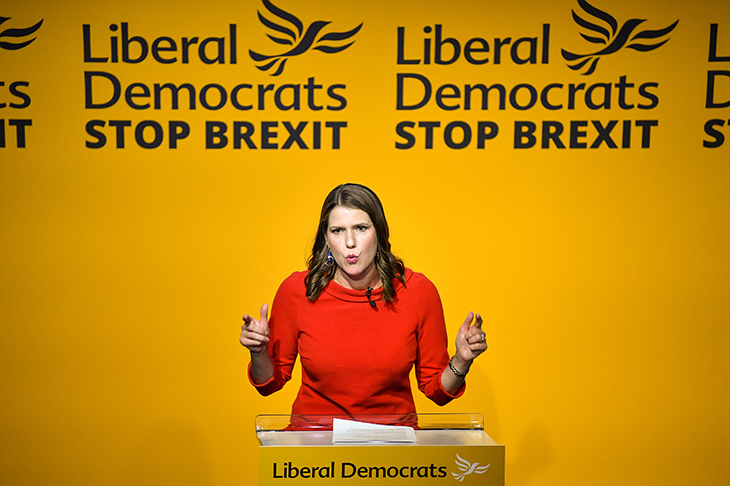Jo Swinson is right. Most of the gains that it’s worth her party aiming for would be made at the expense of the Conservatives. There are three reasons. First, glance at the 29 seats where the Liberal Democrats came second in 2017. Some 22 produced a ‘close’ result. Sixteen of these are held by the Tories, and only four by Labour. As my Times colleague Oliver Wright explains: ‘Even quite a dramatic swing from any of the other parties towards the Lib Dems could still reap very little reward.’
Secondly, Conservative and Lib Dem ideologies are not diametrically opposed. Anyone who’d even consider voting Tory would be fiercely resistant to Jeremy Corbyn. Lib Dems strike us, the Conservative–inclined, as comparatively harmless. So places where Tories abound tend to be susceptible to Lib Dem advances when Tory voters are fed up with their party.
But in this election there’s a third reason for Lib Dems to target Tory seats. By far the biggest impetus for switching to the Lib Dems will be what gave them huge gains at elections to the European Parliament: Remain. At least four million Tory voters in the European referendum voted to stay, and the Lib Dems are a beacon of Remain to which many such voters, including me, are drawn.
By contrast, Labour’s more equivocal stance should be enough to keep most Labour Remainers grumblingly reconciled. It’s us former-Tory Remainers who are on the turn. And pitching the Lib Dem appeal towards such voters may also help Lib Dems act as a spoiler for the Tories in seats where they face a serious challenge.
So what the hell are the Lib Dems up to in South West Hertfordshire? David Gauke — former chief secretary, former work and pensions secretary and former justice secretary in two Conservative governments — is brave, capable, consistent, liberal, loyal and personally pleasant; and he’s been widely respected at Westminster as the kind of steady and principled politician a prime minister can trust. Why are the Lib Dems trying to trip him by putting up a candidate who will split the non-Tory vote?
For Gauke (as for many of us), Boris Johnson was the last straw, and Gauke resigned over the issue of a ‘no-deal’ Brexit. He then lost the Tory whip, telling the Evening Standard this week that ‘I felt a huge sense of relief when the whip was restored to others and not me… I would have been in a really difficult position, finding myself campaigning for the Conservative party and hoping it didn’t get a majority’. He believes that if a Tory majority is achieved then no deal is by no means off the table, and Tory Brexit hardliners will agitate for ‘clean break’ terms when Britain seeks a trade agreement with the EU, while the 2020 deadline for these negotiations looms.
Now Gauke is standing in his old Hertfordshire constituency as an independent. He supports a second referendum in which he would campaign for Remain. Gauke (who has advised Remain Tories to vote Lib Dem wherever that party has a chance) would be in every sense the kind of independent that Swinson and her party could do business with. In SW Herts, where 54 per cent voted Remain, he faces a stiff but not impossible battle. In 2017 he (as a Tory) got some 35,000 votes, to Labour’s 15,000-odd and the Lib Dems’ 7,000.
There is no way Corbyn’s party is going to make headway with the voters of Chorleywood, Rickmansworth and Tring. Berkhamsted, where the average price of a residential property is £725,000, is not ready for the socialist revolution. The Lib Dems, who last time won one fifth as many votes as the Tories, are even worse placed. If anybody is capable of cracking that massive Conservative majority, it can only be their widely respected former Tory MP. Nigel Farage’s Brexit party are standing aside to help stop him. If Lib Dem Remainers won’t make common cause with Gauke, they help Farage keep SW Herts Tory.
So why are Jo Swinson’s Liberal Democrats helping the Brexit party? Can there be a stronger case for their sitting this one out so as to reduce by one the Tory tally on 12 December, and gain an MP who will work alongside Lib Dems? I hear the decision was hard-fought within Lib Dem HQ, with many local Lib Dems doubtful about (effectively) trying to stop Gauke, but that the order came ‘from on high’ to put up against him. Whatever could Swinson have been thinking?
Her party have now adopted a candidate, local borough councillor Sally Symington. Having submitted her nomination papers, Cllr Symington cannot now formally withdraw. But informally she could still do so.
Otherwise, imagine that on a similar overall turnout, Symington puts up a plucky fight; and imagine that by taking 3,000 votes from Labour and 4,000 from the Tories she doubles the Lib Dem vote to 14,000, and that Gauke takes (as he will) a huge chunk of previously Tory votes and ends up with 18,000; and the Tory candidate gets 22,000. Cllr Symington and her party leader will both know that they handed the seat to Boris Johnson. Why risk that, when the Lib Dem chance of winning themselves is zero?
The argument I’ve taken you through may sound purely local, a one-off. It isn’t. Voters with Lib Dem intentions like me, and Remainer Tories who haven’t yet decided, and those parts of our news media that are sympathetic to Swinson personally look at this decision and feel baffled and demoralised. We like her; we think her smart, rational and well-intentioned. And then she does this to David Gauke, a good man, and one who openly advocates for her party. Why?
Perhaps only Sally Symington can now redress the mistake. By stepping back from the fight she could swing things: not to her own advantage — she cannot win — but in favour of a good man and the best available outcome. She must surely be mulling it over.
Got something to add? Join the discussion and comment below.
Get 10 issues for just $10
Subscribe to The Spectator Australia today for the next 10 magazine issues, plus full online access, for just $10.
You might disagree with half of it, but you’ll enjoy reading all of it. Try your first month for free, then just $2 a week for the remainder of your first year.















Comments
Don't miss out
Join the conversation with other Spectator Australia readers. Subscribe to leave a comment.
SUBSCRIBEAlready a subscriber? Log in